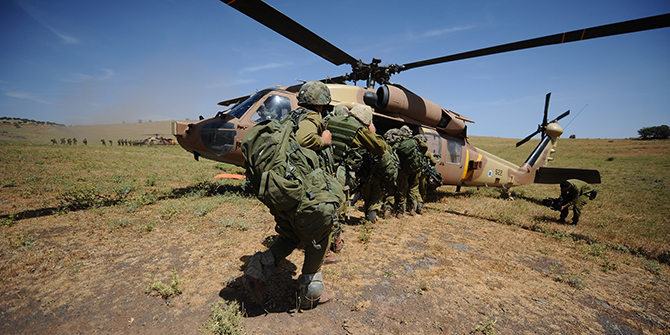by Jane Kinninmont
Repression in Bahrain has intensified since the UK’s announcement in December that it would open its first permanent Middle Eastern military base since 1971 in the kingdom. This week, the authorities announced the leader of the main opposition party, Al Wefaq, would be tried as a ‘coup plotter’, and a court handed down a six-month sentence to a prominent activist for insulting the security forces in a tweet. The following day, the British foreign secretary, Philip Hammond, told the British parliament that Bahrain was reforming and ‘moving in the right direction’. While the repression in Bahrain partly reflects internal dynamics, the government’s confidence to carry out such measures is bolstered by the staunch support it has both from its Gulf neighbours and from the UK. The UK government argues it is supporting reform in Bahrain, and that public criticism of the Bahraini authorities will only backfire. But the praise lavished on limited reforms, at a time when all the senior political opposition leaders are in prison, is leading Bahrain’s large, diverse and popular opposition movements to become increasingly critical of the UK.
UK diplomats have described the base as part of a broader strategy to strengthen links with longstanding Gulf allies and to combat the growing extremism afflicting the region. It is also intended to reassure the Gulf Arab monarchies that the UK is committed to their security even as they question the US’s long term commitment there, given its interest in making a deal with Iran and its changing energy needs. For the British military, bases in the Gulf are particularly important now that UK troops have withdrawn from ground positions in Afghanistan and Iraq, but could still be drawn back into the region – most obviously, Iraq, but potentially also other countries where states face profound threats to their authority and territorial integrity. There is also a party political element. Britain’s withdrawal from the Gulf in 1971 was the policy of a Labour government, and was opposed by the Conservative party, which leads the UK’s coalition government today. Meanwhile, the junior coalition partner, the Liberal Democrats, have publicly questioned the strategy. For the UK government, it has therefore been important to start implementing its enhanced commitment to the Gulf ahead of the 2015 election.
In fact, the symbolic, political import of the announcement is greater than the physical change it represents to British military capacities in the Gulf. Britain has been deploying ships in Bahrain throughout the period since its 1971 withdrawal. Currently they deploy minesweepers; in the future, the base will be able to host larger vessels like aircraft carriers and destroyers. The announced cost of the base is £15m ($23m), which a participant at a recent Chatham House workshop described as less than the cost of a house in some parts of London. At the other end of the spectrum, the US is spending US$580m on expanding its base in Bahrain, which is its main naval base in the Gulf.
But the symbolism of choosing Bahrain as the location for the first 21st century British base in the region is deeply problematic. It suggests that Britain’s relations with the Gulf continue to be driven by economic interests and are narrowly defined security priorities. Certainly, the British government would like to persuade the Bahraini government to have a more accommodating and reformist approach to opposition. It had hoped that the king and crown prince would lead further political reforms, following the significant steps taken by the king in the early years of his reign. But even before 2011, it was clear that the reforms had halted, and in some areas regressed. That was one of the reasons for the uprising of 2011, which in turn was met by fierce repression.
Since then, the government has skillfully carried out a number of legal and institutional reforms, which have been just enough to enable Britain to give the benefit of the doubt to its old allies, even as the authorities have also doubled down on all forms of political opposition. ‘Reform’ is a vague and relativistic concept; the intensity of the crackdown in 2011 has allowed the government to claim it is ‘moving in the right direction’ by not repeating some of the more extreme tactics, even if the political and human-rights situation remains far worse than in 2010. The authorities are adept at adopting selective reforms, such as prisons inspections, an ombudsman who investigates complaints of abuse by the security forces, and codes of conduct for those forces, always with an emphasis on ‘international best practice’ and training from Western governments. Meanwhile, they create laws that criminalise many elements of peaceful opposition activity – for instance, the deputy leader of Al Wefaq has also been sentenced to six months in prison for tweeting that bribery marred the elections – and portray the ensuing repression simply as enforcing the ‘rule of law’.
Britain has supported reforms, such as the security-sector reforms mentioned above, wanting to make the monarchical system more sustainable and inclusive. Investing time, energy and money in supporting such reforms increases the incentives to see them as a success. In the run-up to the November 2014 Bahraini parliamentary elections, the UK was working behind the scenes to persuade Al Wefaq to participate in the polls, ending the boycott it began in 2011. It was not surprising that the group ultimately decided to continue the boycott, without major confidence-building measures by the government; the crown prince promised the parliament would be able to discuss key issues of political reform, but Al Wefaq did not want to take the risks associated with participating (potentially losing support, and dividing the opposition, by being seen to accept the legitimacy of an institution they see as virtually powerless).
Al Wefaq’s decision may have reflected the views of its domestic support base, but has alienated the members of the ruling family who previously gave it some protection, and has soured its relations with Western governments. British diplomats expressed disappointment in its decision. When the British government subsequently announced the new base, Al Wefaq criticised it, saying the move would simply bolster the government’s confidence and make political reform less likely. For this, it was again criticised by British diplomats, who said opposing the base gave succour to extremists, and cited the overriding importance of combating the Islamic State. But the Bahraini government’s move to arrest the country’s main opposition leader, just weeks after the base was announced, has lent credence to those opposition criticisms.
Bahrain’s opposition movement is substantial. It almost certainly represents the majority of the local population. Strategically, a long-term military commitment to the Gulf would have been far better made with the buy-in of that population. This could have been achieved at a different time. Bahrain’s Shi’a opposition movements have traditionally been fairly pro-Western. But the timing of the decision has meant that Britain’s new base will be deeply unpopular with the local society.
 Jane Kinninmont is a senior research fellow and deputy head of the Middle East and North Africa programme at Chatham House. Her previous positions include associate director for the Middle East and Africa at the Economist Group, Middle East and North Africa editor and economist at the Economist Intelligence Unit from 2006 to 2010 and managing editor for Middle East and Africa at Business Monitor International from 2003 to 2006. She tweets at @janekinninmont.
Jane Kinninmont is a senior research fellow and deputy head of the Middle East and North Africa programme at Chatham House. Her previous positions include associate director for the Middle East and Africa at the Economist Group, Middle East and North Africa editor and economist at the Economist Intelligence Unit from 2006 to 2010 and managing editor for Middle East and Africa at Business Monitor International from 2003 to 2006. She tweets at @janekinninmont.
Other posts in the series:
- Bahrain redux, by Neil Partrick
- The ‘red line’ of Sheikh Ali Salman’s arrest: Bahrain moves into new territory, by Christopher Davidson
- The deepening divide in post-election Bahrain, by Marc Owen Jones
- Radical spatial-demographic transformations: the need for an intersectional view, by Mohammed AlDaaysi
- The path to reform in Bahrain, by Ali Alaswad






